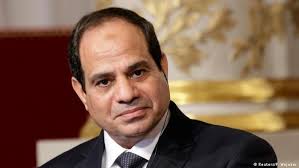“There is no end to the escalating repression.” This is how Human Rights Watch (HRW) described the human rights situation in Egypt during 2020, as Egyptian authorities intensified their repression of peaceful critics of the government, effectively eliminating any space for peaceful assembly, association, or expression. In its global report, the organisation said that the coronavirus outbreak had exacerbated the horrific conditions of detention, in light of the prevention of prison visits from March to August, without alternative communication means.
HRW spoke about the death of dozens of prisoners in custody, including at least 14, apparently due to corona. According to the recent report, “Egyptians will continue to live in the harsh, tyrannical grip of Abdel Fattah al-Sisi’s government in 2020.” The report added, “Tens of thousands of government critics, including journalists and human rights defenders, are still imprisoned on politically motivated charges, with many of them being held in prolonged pretrial detention.” The authorities frequently used terrorism charges against peaceful activists and harassed and detained relatives of dissidents abroad.
HRW also cautions that the authorities use broad “morality” charges to prosecute female influencers on social media over their posts, as well as witnesses of gang rape after they reported cases of sexual assault on the Internet. It pointed out that media outlets close to the government discredited rape witnesses by posting photos and videos on the Internet without their consent. Regarding violations of the police and security forces, the organisation said that the Ministry of Interior’s security forces and the National Security Agency forcibly disappeared dissidents who were arbitrarily arrested and tortured, including children. The Ministry of Interior also imposed collective punishment on the families of dissidents abroad, including arrest and prosecution.
In North Sinai, the armed conflict between government forces, especially the army, and the Sinai Province organisation affiliated with the terrorist organisation ISIS has entered its eighth year. The report indicated that the army prevented journalists and other observers from entering the area and prohibited independent coverage of the events taking place there. The army also continued to demolish homes and forcibly displace thousands of residents, often without providing compensation or alternative housing.
Regarding prison conditions and deaths in detention, the organisation said: “The outbreak of the coronavirus that began in Egypt in February has exacerbated the conditions of detention that were already poor.” HRW criticised the authorities’ imposition of a total blackout on information about places of detention. It banned visits, including visits by lawyers, from March 10 to late August, without providing alternatives such as video or phone calls. According to reliable human rights and media reports, dozens of prisoners died in political cases in detention in 2020, apparently due to a lack of medical care.
The organisation emphasised that the overcrowded Egyptian detention facilities make social distancing impossible. It added that while the government said it released 19,615 prisoners between March and late July, the releases did not include detainees tried for political opposition. These numbers were insufficient to relieve overcrowding in prisons.
Regarding fair trials, due process, and the death penalty, the organisation said, “Judges and prosecutors have kept thousands of people in pretrial detention, often simply for exercising their right to peaceful assembly and freedom of expression.” It pointed out that many of the detainees were kept in detention for longer than the two years stipulated by Egyptian law.
The organisation’s report also pointed out that between mid-March and mid-August, the security and judicial authorities took the coronavirus outbreak as an excuse to prevent even sham sessions from reviewing detention, in violation of Egyptian law and regional African and international human rights treaties. The report added that the authorities detained hundreds, and often thousands, without a judicial review, even a sham, of their detention, stressing that “in the past, judges and prosecutors used to deny lawyers and detainees a real opportunity to present their defences or review any alleged evidence.”
HRW added that Egyptian courts continued to impose the death penalty for a wide range of crimes, including cases of political violence and alleged terrorism. Judges almost always failed to investigate defendants’ allegations of enforced disappearance and torture. Regarding freedom of association and attacks on human rights defenders, the organisation affirmed that the authorities would continue to severely reduce the space available for civil society organisations and target human rights defenders. Concerning freedom of assembly and expression, the organisation said, “The government continued to criminalise peaceful assembly and punish its peaceful critics.” In late September and early October, authorities arrested nearly 1,000 protesters and bystanders before and after sporadic anti-government protests in different towns and villages in 21 governorates.
Egypt continued to arrest dozens of politicians and activists due to their plans to form a new electoral alliance to run in the 2020 parliamentary elections. Authorities have arrested at least 10 healthcare professionals who challenged the official version of the virus outbreak or criticised the lack of equipment at their work. The regime continued to silence journalists, bloggers, and critics on social media with an increase in the use of the 2018 repressive cybercrime law, and they blocked hundreds of news and human rights websites without a warrant since 2017.
Regarding freedom of belief and religion, the organisation said that restrictions on building churches remain largely in force four years after the issuance of Law No. 80 of 2016 regarding building churches. The government legalised only 1,638 churches that were operating without official permits, that is, roughly 25 per cent of church buildings that applied for legal status. Regarding women’s rights, gender identity, and sexual orientation, the organisation said, “The Egyptian authorities have carried out a wide campaign of arrests and prosecutions against influencers on social media, in violation of their rights to privacy, freedom of expression and non-discrimination.”





Recent Comments